In this guide we’ll show you how to consistently get high quality practice for your consulting case interviews. The best case interview practice you can get, guaranteed.
Even if:
- You don’t know anyone who’s preparing (and fear the competition from MBA students who know 1,000 other people doing it).
- You don’t know where to find high quality cases that will actually move the needle in your preparation.
- You work a full time job and can’t spare 3 hours a day to prepare with other people.
This guide will help you get started even if you’ve never done this before and don’t even know how you’re supposed to practice.
If you’re a more advanced candidate, you’ll love to learn EXACTLY how to steep up your learning curve and improve significantly with each and every case.
Specifically, we'll show you:
How to efficiently schedule and get the most out of mock interviews (so you improve in every single case interview practice session)
Looking for examples of case interviews?
Check out our curated list of the 9 BEST case interview examples from all around the web. There, you’ll find just the most realistic cases, along with my comments and the key take-aways from each one.
Table of contents
PART 2 | Mock Interviews
- How to find good partners: What makes a good partner and the top 4 partner sources
- Nurturing your inner circle: How to make sure you’ll always have AMAZING partners available to practice with
- Mastering the interviewer role: EXACTLY how to get unique, valuable experience from when you’re the interviewer and 2X your improvement in mock interviews
- The Case Debrief Technique: How to make sure you find solid improvement in every single case and that you know exactly where to focus before the next one
- The top-5 sources of cases and how to use them
- How to deal with consultant “coaching calls”
PART 3 | Practicing by yourself
Is it better to practice with others or on your own?
Most people (even consultants from top firms, such as McKinsey, Bain and BCG) recommend candidates to spend most of their time practicing with other candidates.
Their reasoning? It’s more similar to the real interview, so it must be better.
That’s only partially true.
In reality the optimal preparation involves BOTH practicing with other people and by yourself.
To explain why, let me make an analogy with sports.
If you want to be a good basketball player, you need to play whole matches. You can’t be the next LeBron James without ever stepping into a court.
But is the best basketball player the one who’s played more matches?
Of course not.
In fact, take a look at any athlete’s training schedule and you’ll see most of their time is actually spent training technique between real games.
The same is true for case interview prep.
If you NEVER practice with other people, you’ll obviously miss the skills that make problem-solving a whole thing. Still, if you JUST practice with other people you’ll miss out on developing specifics.
Just as a quick example, if you’re constantly messing up your initial structure, it’s often better to spend some time practicing JUST the initial structure instead of doing more and more full cases (where you’ll certainly miss the initial structure).
This is why this guide covers BOTH. We’ll show you how to optimize your mock interviews, and also how to get the most out of practicing by yourself.
Mock Interviews
Solving problems in case interviews is a practical skill. Like playing a sport, or playing an instrument, or even speaking a language.
That’s why only theory and no practice will not get you any more comfortable in an interview.
Can you imagine reading a ton about basketball, watching a bunch of videos, and then being thrown in a court to play your first game competitively, without ever touching a ball?
That’s why you do mock interviews.
The reason they’re so popular is that they expose you to different types of interview situations and interviewer styles, so that you can rest assured that you’ve seen it all before your interviews.
We’ve worked with hundreds of long-term coaching clients for case interviews.
After a while, we noticed a pattern.
Candidates who had more quality practice (the kind that we’re gonna teach you in this guide) had steeper learning curves and, ultimately, got more offers.
However, 99.99% of candidates who are doing mock interviews face most of these problems:
- They get frustrated doing mock interviews with candidates who lack interviewing skills, give unrealistic cases and can’t seem to give feedback that is specific enough to actually be useful.
- They waste HALF OF THEIR TIME because they don’t apply “interviewer-role best practices” that would allow them to learn as much from being an interviewer as from being interviewed.
- They go from case to case like a headless fly and without a clear strategy that tells them what specific habit to focus on in each practice session, what to improve on between cases, and what type of case to do next in order to maximize their learning curve.
We don’t want you to go through the same, which is why we’ve broken down everything that you need to know about practicing with mock interviews into five parts:
- The four specific sources where you can find other candidates to practice with (even if you don’t know anyone else who’s applying).
- How to nurture an inner practice circle so that you can effortlessly schedule a case with an AMAZING partner anytime you want.
- How to master the interviewer role so that you can double your learning rate.
- The “Case Debrief Technique” to virtually guarantee you always get the most out of each case and to systematically determine what to do before the next one.
- The 5 best sources of cases and when to use each one.
Finding good partners
Whenever I ask candidates what their main struggle with case interview preparation is, the responses are the same over and over again:
It’s really tough to find good partners to do mock interviews with.
But what makes a partner a good partner, to begin with?
It’s two qualities:
Quality #1) Experience – relatively to where you are right now.
Your partner’s experience depends mostly on how many cases they’ve done.
But we’re really interested in what their experience brings to the table in the mock interview…
- Their depth of understanding of case interviews in general.
- How good of an interviewer they’ll be.
- How deep their insights will be, and so on.
Quality #2) Caring.
Interviewing well and giving giving good, insightful feedback takes a lot of energy.
This means that how much your partner cares about your improvement is as important as their skill level.
Your partner might be a star candidate AND a star interviewer and still suck. Yes, even if they’re a McKinsey partner.
You’ll only get something from them if they care enough to share it with you.
A good partner uses good cases, that they understand well. They’re willing to spend energy and focus to give you great feedback, and they’re willing to give you the gift of honesty.
The problem is: you can’t really know this kind of stuff beforehand.
At the end of the day, the first case with each new partner is a hit or miss process.
All you can know beforehand is how many cases they did – and perhaps a short bio.
You’ll eventually need to step out of this gamble that is doing cases with random new strangers every time.
The next section of this guide is all about nurturing the best partners you find.
But before we get to that, we need to show you the main sources to get fresh partners to do mock interviews with.
Source #1) Someone you know who’s gone through the process.
If you do have a friend or acquaintance who’s gone through consulting case interviews (even better if they were at McKinsey, Bain, or BCG), ringing them up should be among your top ideas to find a case partner.
You’ll get access to a much higher quality partner AND they’re someone who’ll care about your outcome.
FAQ about this source:
“How do I know if my friend is any good?”
As a rule of thumb, if they’ve been to at least one final round, they’re likely to be helpful to you.
“How do I find them?”
The easy way is to remember which of your acquaintances have gone through the process. But you can go further.
Ask friends about their friends.
Search them on Linkedin, as you might find out you have acquaintances that you didn’t know were working in consulting firms.
This last one’s a longer shot, but if you search your social media and messaging apps for “case interview”, you might find someone mentioning them in older private or group messages. That person could be a potential case partner.
“Why would this person help me?”
This person might be willing to help you out just out of pure kindness. But it usually pays off to give them something in return.
They’ll understand you’re really grateful about this, and they’ll be more likely to help you again.
Consider paying them lunch, dinner, or drinks. Or maybe exchanging favors. Hell, maybe even paying them money.
Any of these options are MUCH cheaper than hiring a coach.
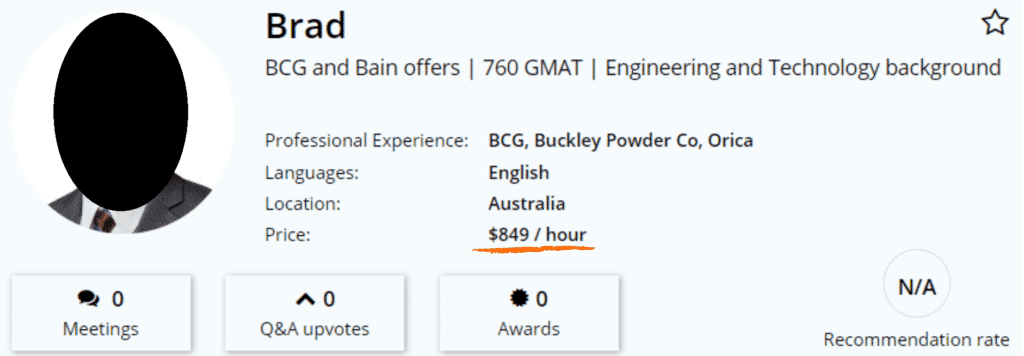
Source #2) Case Interview Practice Groups.
People who are practicing for their interviews often create or join social media groups and use those as sources of partners for their mocks.
As a result, there are several of those groups, spread around Facebook, WhatsApp, Telegram, and others.
This is a great source as it gives you instant access to hundreds of potential partners with fast turnaround times. You can often schedule an interview for tomorrow if you want.
These are the pros. But what about the cons?
The biggest drawback of these groups is that quality and experience of other candidates can vary A LOT.
To find one of them, you can just go to whatever social media you choose (Facebook, Slack – this won’t work for WhatsApp) and search for the right terms. Here are some examples:
- “Case Interview Practice”
- “Case Interview Prep”
- “Consulting Club”
- These same keywords in your native language
(If you look for these in English, you might find larger, international groups, where people from all over the world will do mock interviews in English.)
On Facebook, you’re gonna find hundreds and hundreds of these groups (they’re usually closed groups and you’ll need to ask for permission to join). Here’s how to find ones that are worth requesting access to:
First, you’ll ask yourself if they’re large enough.
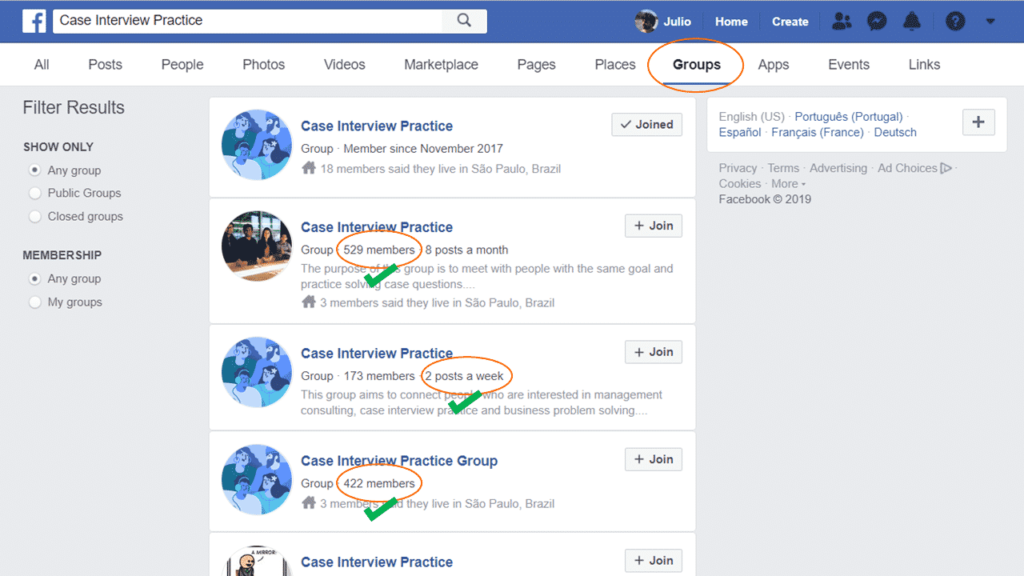
I’d only open the ones that are above 200 members. Fewer than that, they’re probably not worth my time.
Next, check whether that group is active or not.
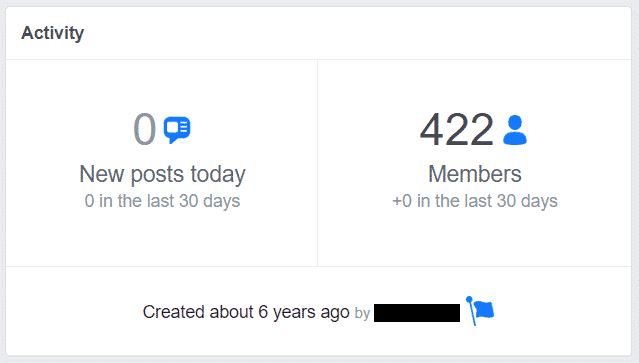
Here are two large, active groups, that might be worth the try.
- Case Interview Practice (yes, they both have the same name)
Here’s an example of an inactive group that’s not worth your time. At the moment I’m writing this, despite having >400 members, the group had no publications in the last 30 days.
And here’s a smaller but active one. <200 members, but 4 publications in the last 30 days.
There are also groups that are made by and for students of specific schools. This one from HEC is a great example.
They’re large and active, but I’m not sure how welcoming they’d be to people who are not from the school.
My guess?
If you’re there to practice like they are, you’re doing everyone a favor, and you’ll be welcome to join. Especially if you speak their native language.
Source #3) Matching websites.
Matching websites are where you can be 100% sure you’ll find someone to practice very soon. Even more than the large social media groups.
And the candidates there tend to be savvy about cases. After all, they’ve gone out of their social media and social circles and found the best spots for finding mock interview partners.
Some of the people there will be very good while others will not (even though they might think they are).
Here are the main matching websites out there:

Source #4) Your university’s consulting club.
If your university has a student consulting club, this might be a good source of partners for you.
They’re the only scalable source of in-person partners in this list, and they’ll often have structured, periodic meet-ups.
The problem with these clubs is that they tend to be dogmatic in their ways while being led by people who may or may not have gone through the recruiting process.
Even if you’re alumni you can often use your school’s consulting club.
And if you’ve moved away, you can still tap into your network and interact with the students online.
Nurturing your inner circle
By using the 4 sources from the last section, you will easily find partners to practice with.
The problem is: most of the time this is going to be a gamble – some people will be very good, others will be alright, and some will be outright insulting to your efforts.
The solution to this case interview roulette is to nurture a tight group of quality candidates who practice together.
We call this “your inner circle”.
While you can always go back to the sources and find new partners to practice with, your long-term goal is to cultivate a strong, tightly-knitted inner circle so you can effortlessly schedule a case with a great partner at anytime you want.
This is the ultimate mock interview hack.
To form such a group, you’ll need to…
- Be liked by people you do cases with (we’ll show you how in the “Mastering the interviewer role” section).
- Reschedule cases with the partners you like the most. (Finding a great partner is a rarity. Keep the good ones and discard the bad ones to have a selected list of trusted partners that you can go back to over and over again.)
- Cultivate your relationship (send them articles and materials, share your learnings, etc).
- Connect great partners (make introductions between the partners you like the most and ask for introductions to their best case partners).
The best partners are hard to find. They’ve already left the case interview rat race and are no longer lingering in the web looking for random candidates to do random cases with.
They’ve cultivated their own inner group and only do high quality cases with high quality people – people who are experienced and caring and who look out for one another.
The good news is: you can always find people to create your own high-quality inner circle.
All you need to do is to be a high-quality candidate yourself and to be able to separate the wheat from the chaff.
But to do that you’ll need to master the role of the interviewer.
Mastering the interviewer role
Most people are a little bit stingy when doing mock interviews.
They’ll ONLY give their time by being the interviewer so they can have their turn being interviewed.
They think they only get value when they’re in the candidate’s role.
In reality, you can get unique, valuable experience in the interviewer-role that you could never get any other way. That is, as long as you do the interviewer-role as it’s supposed to be…
I’ve made a video to show you EXACTLY how to master the interviewer’s role.
Here are three counterintuitive insights you’ll find in the video:
Counterintuitive insight #1) The key to systematically learn from other people’s mistakes (so you don’t have to learn the hard way).
Counterintuitive insight #2) Why real MBB interviewers only use 2-3 cases over and over again, and why you should do the same.
Counterintuitive insight #3) The exact structure to give feedback that other partners will love (so you can cultivate your inner circle).
The Case Debrief Technique
Mastering the interviewer role is one lever to learn 2X more than the average candidate for every case that you solve.
But there’s another one: the Case Debrief Technique.
The Case Debrief Technique is a series of 5 steps that you should do on your own after EVERY mock interview that you do.
By doing these 5 steps, you will virtually guarantee that you got the most out of the case you just did AND that you will focus on the right things to work on before your next one.
By doing it, you will know:
- Exactly what type of case to do next and what to watch out for while doing it.
- What’s the #1 technique you should learn and practice before your next case.
- What’s the #1 business concept or piece of theory you should learn about before your next case.
Here’s how a case debrief with all 5 steps in it should look like:
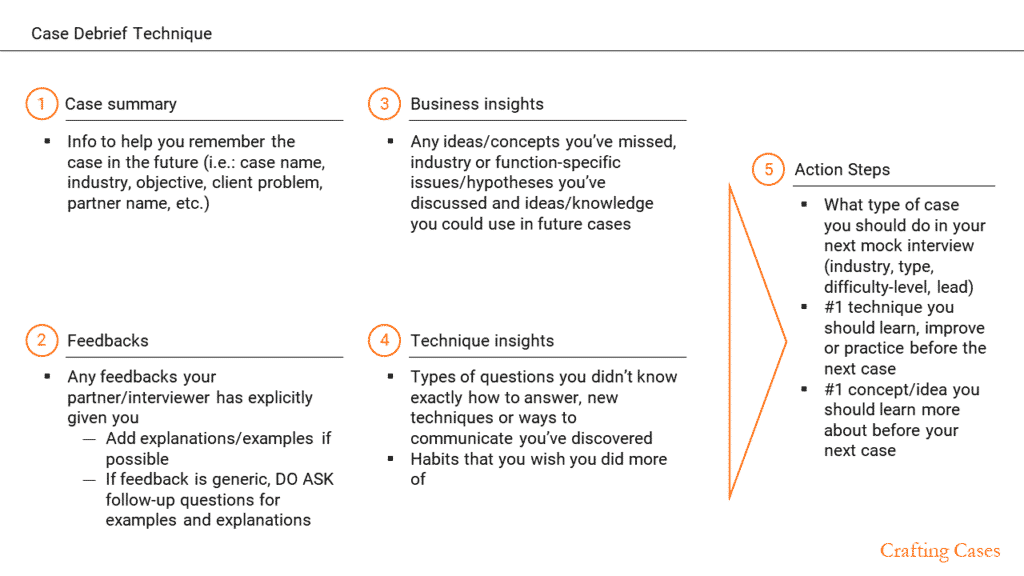
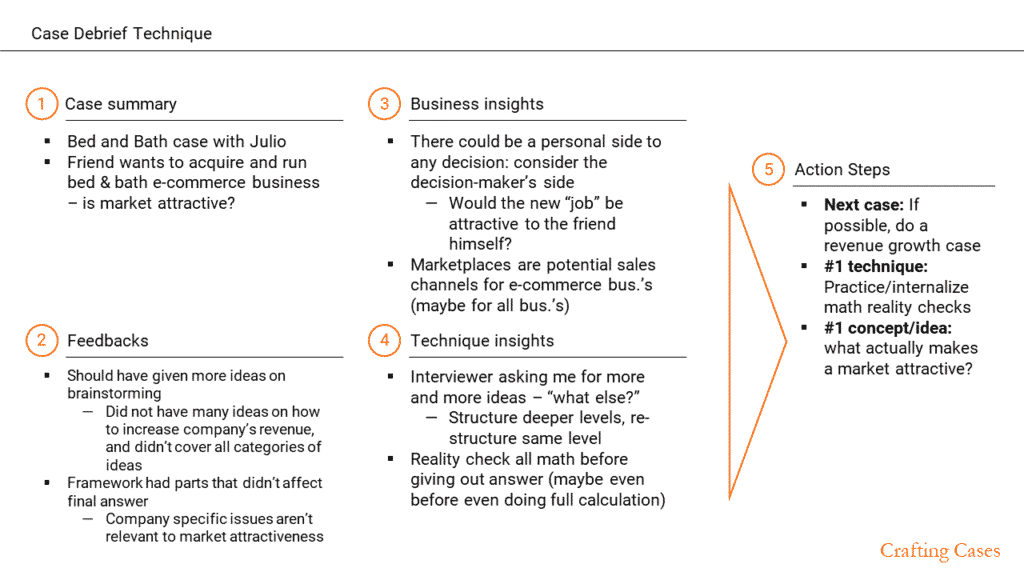
In this example there are 2 specific things this candidate should do before his/her next case:
- Go to Case Interview Fundamental’s calculations module and practice Reality Checking of their math.
- Review theory and case/drill answers that include market attractiveness, and spend time working on what would be a perfect answer for this case.
And in his/her next case, they should ask their partner to do one case with at least one estimation case in it.
PRO TIP: Right before doing the next case, write down on the top of the sheet of paper you’re using to solve it exactly what you want to get right in this case.
For example:
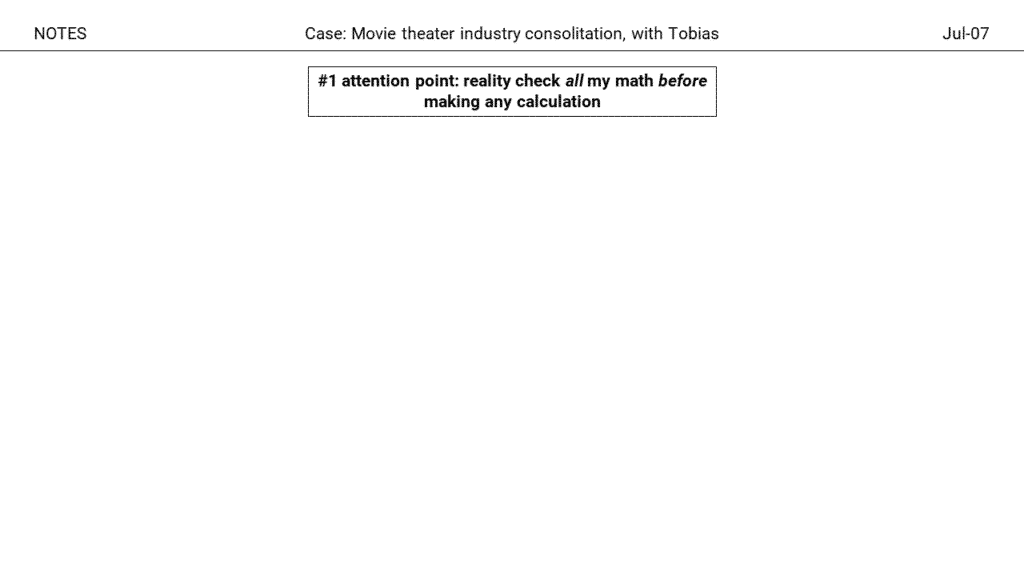
Sources of cases
Most candidates I know download half a dozen business school casebooks. They do that because they wanna have hundreds of cases to interview their partners with.
But that’s not the best way to do it.
As you’ve watched in the video back in the section on Mastering the interviewer role, it is best to know 2-3 cases like the back of your hand than to be always giving other candidates a case for the first time.
We call this the Vinyl Burger Technique.
Why? Because my favorite burger place (which is called Vinyl Burger) only has one item in its menu. And it’s AMAZING.
This brings you many benefits:
- You’re gonna be amazing in the interviewer role.
- You’re gonna learn a lot about how different candidates deal with similar situations.
- Most importantly: You don’t have to find that many cases to work with… You only need a few good ones.
Here’s where to find them:
Source #1) The Crafting Cases casebook.
This is a casebook designed specifically for the Vinyl Burger Technique. It has only two cases, but they’re explained IN-DEPTH. For each case you will find:
- The specific wording to use in each question within the case, including follow-up questions and the seemingly spontaneous questions MBB interviewers love to use.
- Examples of good, bad and amazing answers.
- Checklists so you can give precise, insightful feedback to any candidate.
The problem is that if everyone that reads this article only uses these 2 cases, they’re gonna get old. Which is why you need the other sources too…
Source #2) Youtube videos.
Great source of (overall) good quality cases – if you know which ones to use and what to watch out for.
What I love about YouTube videos is that you can see real life interaction before using the cases with other people.
Source #3) Business school casebooks.
Good option if you’re looking for specific case types or cases in a certain industry. It’s also unlikely that your partner will have seen most of these cases before, due to the sheer number of them.
There are some problems, though… More on that in the “Fill in the gaps” section below.
Here are some of the most popular casebooks out there:
- Duke 2015
- Illinois 2015
- Fuqua 2014
- McGill 2013
- LBS 2013
- Darden 2012
- Insead 2011
- Kellogg 2011
- ’10 or older casebooks
Source #4) Matching websites.
Websites that match candidates with other candidates to practice with (such as PrepLounge) often have case libraries.
These cases vary in quality and have the same pros and cons as business school casebooks.
Source #5) Consulting firms websites.
Most firms have at least a few cases for you to practice with in their website. You can use those to interview other candidates with.
They come straight from the source, so they tend to have realistic case questions and they show which insights should be uncovered in the answers.
Unfortunately these firms are not in the business of teaching you how to get an offer with them, so the answers are incomplete and unstructured (which means you need more than they’re suggesting to do well in real life).
Here are links to the pages with the best practice cases by consulting firms:
- McKinsey practice cases (scroll down to “Practice cases”)
- BCG practice cases (their interactive cases are cool, but it takes some work to adapt them to interview someone with)
Filling in the gaps…
As you interview more and more people with a specific case, you’ll soon notice that no matter how much information you have, there’ll always be something missing.
- The candidate might ask for information you don’t have…
- They might take a completely diffferent yet appropriate direction…
- The candidate might even find an inconsistency in the case that no one has ever noticed before.
All cases from all of these sources should be treated as a starting point. As you use these cases, you should fill in the gaps and make these cases your own.
Here are a few ways you can improve upon them:
- Make better and/or alternative case questions that change the problem slightly and make the case more versatile.
- Know pieces of information that candidates frequently ask. (You might have to make them up using a bit of logic.)
- Come up with follow-up questions that make the case even more interesting.
- Know alternative ways to answer each question that are even better than the suggested ones.
Knowing the nuances of the cases you use with other candidates will not only make you a better interviewer. It’ll also make you a better problem solver in general.
This will up your chances of getting an offer.
How to deal with consultant "coaching calls"
Some people get the golden opportunity of doing “coaching calls” or just mock cases with consultants from top firms while they’re preparing.
These consultants might be someone you know or even a random associate assigned by the firm.
Though these are precious opportunities, they’re also scary.
We’ve seen our fair share of candidates freaking out before one of these calls.
People think that they’re being evaluated in these situations. So yeah, they freak out, and I would too.
Here’s the real deal:
There are two types of situations like this. Either you already have an interview scheduled or you’re doing that call with the intention of potentially getting a recommendation and optimizing your chances of getting an interview.
In the first scenario, doing poorly in your practice case will not hurt your chances.
These “coaching calls”, or “practice cases” are there solely for your benefit.
Consulting firms tend not to play games. If they tell you you’re not being evaluated, then you’re not being evaluated.
Still, it’d be wise to save these golden opportunities of getting prime feedback from real consultants to when you’ve got over the beginner slump.
Doing these coaching calls too early is as wasteful as asking Garry Kasparov to teach you how different chess pieces can move accross the board.
The second scenario is a little bit trickier.
You don’t have your interview scheduled yet, and the consultant in front of you (or on the other side of the line) has the influence over you getting your interviews.
He or she will only recommend you if they think you’ve got the skills.
If you have an opportunity like this, do your best to prepare as much as possible beforehand. As simple as that.
Either way, I would hold this opportunity until you have at least 20 cases under your belt.
Here are the top three things you should know before going to your “coaching call” to get the most out of it:
#1) The feedback you get will lean towards nice (vs. accurate).
Although your interviewer wants to help you, it’s more important to him and the firm not to get you upset at them and perhaps drop out of the process.
When trying to be extra careful, they’ll usually sugarcoat your feedback.
Interpret their feedback with that in mind.
#2) The case resembles a first round interview, but it’s not 100% the real thing.
There are two reasons for this.
Number one, the case is invariably easier than what you’ll find in your first round interviews. Everyone who’s done these mock interviews, myself included, has reported that.
Number two, your interviewer will usually be more junior than the real ones.
Why?
They’d rather send someone with a lower hourly rate than someone with a higher one. Plus, there’s more of these people around in the office.
#3) Your feedback will be generic. Here’s what to do about it.
No matter what feedback you get from your intervewer, it will tend to be generic.
But it doesn’t have to be that way.
Your interviewer knows what you’ve missed and how you should’ve answered their question. You just have to get that information from them.
And you’ll do that by asking two simple questions about each piece of feedback they give you:
- In what specific situation did you see this happen? Can you give me an example?
- How would you have responded to this question?
Practicing by yourself
Sometimes you just can’t practice with others.
Maybe you’re commuting, or you just have 15-30 minutes to practice, or you have no internet access.
Or, if you’re anything like me, sometimes you’re just feeling like studying by yourself… It’s energy draining to be doing cases with others all the time.
Most people think that mock interviews are always better than practicing by yourself.
Many times it is. But after working with hundreds of candidates we’ve noticed that this is not always the case…
In fact, the candidates that improve the most in the shortest amount of time are the ones who balance solo practice and mock interviews.
Why?
Because they can use their solo time to practice deeply the skill that needs the most attention.
For example: a 30-minute case will only have one framework. Meanwhile, you can do up to 4-5 framework drills in the same amount of time.
Once you get quality feedback from a mock interview and identify a weakness, it’s more productive to WORK ON THAT WEAKNESS before your next case than to just mindlessly do case after case after case.
I’ve met candidates who got offers from MBB firms (MBB stands for McKinsey, BCG and Bain) just by practicing by themselves.
I would never recommend this as it’s just too risky, but it does show the power of practicing by yourself in improving your skills.
In this section I’ll show you exactly how to harness practice on your own so you can start making use of it right now.
Specifically you’ll learn:
- How to use our free course, Case Interview Fundamentals, which was developed specifically with “on your own” practice in mind.
THE BEST TOOL for solo practice: Drills
Drills are THE BEST TOOL for practicing by yourself.
But you might be thinking… What IS a drill? And what makes them so powerful?
A drill is basically an exercise that isolates a specific task/skill that you’ll perform when solving a case.
For example, doing framework drills means you’re doing a ton of frameworks (just like the ones you would do in the beginning of a case) one after another.
The same idea is used in all activities where you need peak performance.
Tennis players practice their serve multiple times a day.
NBA players allocate a disproportionate amount of time to practice proper basketball shooting technique.
And believe it or not, aspiring Michelin-starred restaurant chefs are insanely intense about how they chop their vegetables.
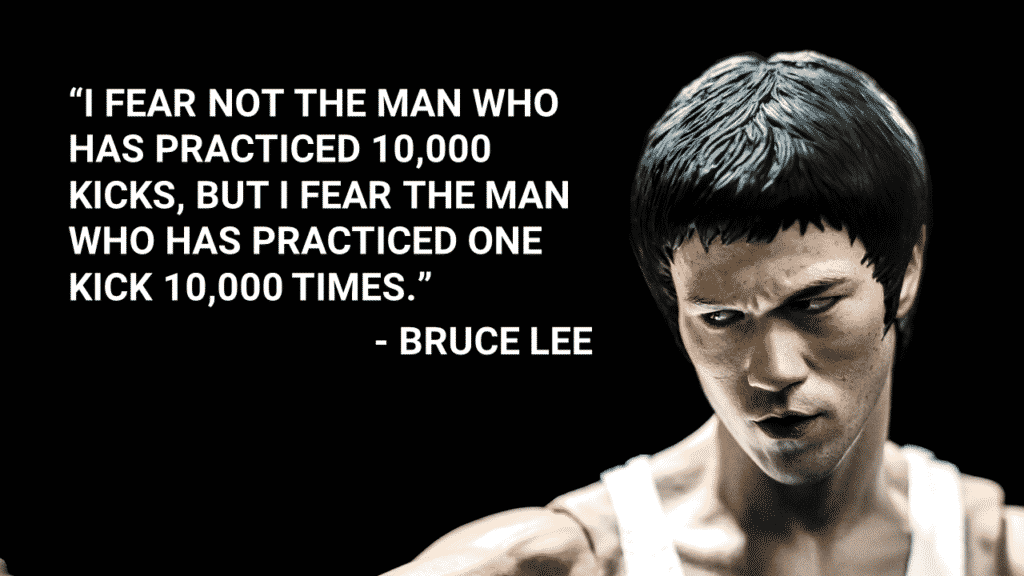
Can’t disagree with Bruce Lee.
The best way to understand drills is to contrast them with what they are not.
On one end of the spectrum you have doing the whole activity by yourself.
In the world of basketball this would mean trying to play a whole game on your own. Not very helpful, is it?
In a case interview scenario, doing the entire the activity by yourself would mean trying to solve a whole case with no one around (e.g. by getting one from a casebook and comparing answers).
While this can be somewhat helpful in some circumstances, it doesn’t tend to be optimal.
You’re not really focusing on improving any specific skill AND you’re missing the whole point of doing a full case, which is to interact with another human being as you solve the problem.
When practicing by yourself, doing drills is usually more powerful than doing whole cases, as you can focus exactly on your weaknesses or improvement areas.
On the other end of the spectrum, there are “Overly Narrow Exercises” (ONEs).
An NBA player aspiring to become a better shooter could spend countless hours doing forearms strength training. How much of that time would be wasted, though? Simply doing shooting drills will get you stronger AND also help you build technique.
Not an NBA coach here, but you NEED to use the 80/20 principle when learning, especially when time is limited, as for most candidates.
When I see candidates doing ONEs, like downloading a mental math app and spending hours doing multiplication, I know right away they’re gonna make a math mistake in front of the interviewer.
Why?
Because some exercises are just too narrow. Just like a basketball match is not a forearm-strength competition, consulting is not all about mental math.
Yes, improving your forearm strength may help you shoot a basketball slightly better, BUT ONLY IF you’re a great basketball player already.
Most people with strong forearms can’t shoot a three-pointer.
Drills are much more specific than full cases, which will allow to have targeted practice, but unlike ONEs, they provide enough context (are similar enough to the real situation) that what you’ll learn is directly applicable to your real interviews.
The best way to learn how to use drills to improve your case interview performance is to actually do some of them.
We’ve made a free course with tons of insights and a drills-based methodology that you can read more about in the next section.
How to use our free course to practice on your own
Over the time, we’ve worked with hundreds of candidates for consulting jobs (most of them were long-term coaching clients) and we noticed that they have the same obstacles:
- Specific weaknesses in specific parts of the case (initial structure, market sizing, quantitative analyses, creativity questions…).
- A strong desire to do at least part of their training without having to rely on other candidates (friends going through the process or strangers from the internet).
- A frustrating lack of materials that would enable them to have quality practice on their own.
As we saw this over and over and over again, we decided to solve that problem for you.
And we did so by creating our FREE course, Case Interview Fundamentals.
Here’s how you can use it to practice on your own:
Step #1) Use the concept of the “6 Building Blocks” to identify your weakness/improvement area
In the first module of case interview fundamentals we’ll teach you about a concept we call The 6 Building Blocks.
These “Building Blocks” are the ONLY six types of questions interviewers ask in case interviews.
They also happen to be at the exact level of granularity that is ideal for drills. Not too broad (like a whole case), not too narrow (like doing random math in a smartphone app).
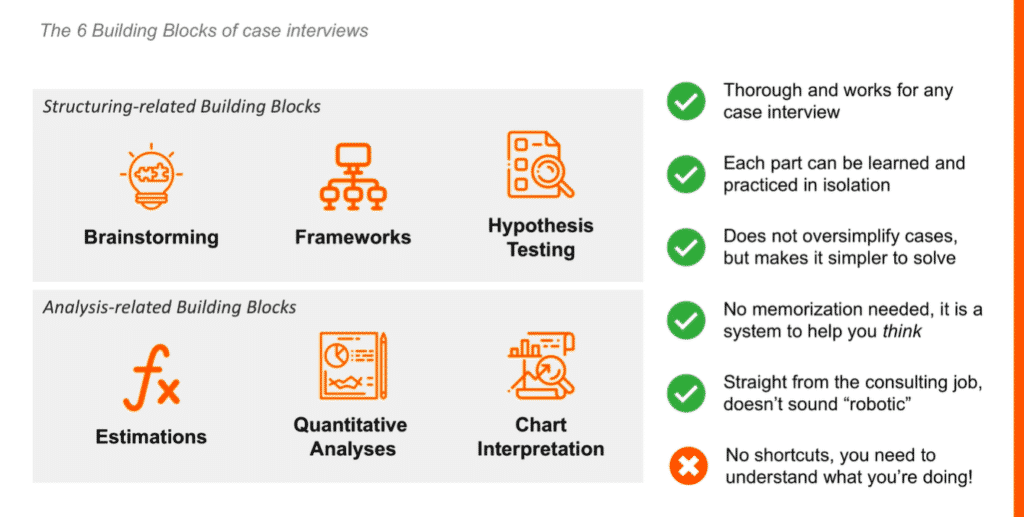
Each of the 6 Building Blocks is explained in detail in a 55-minute video within the first chapter of our free course, Case Interview Fundamentals.
Step #2) Learn the exact step-by-step to answer your chosen Building Block like a real consultant would
Most candidates answer questions kind of randomly.
Instead of using proven procedures that work with clients and interviewers alike, they blurt it out as they think might sound good.
Unfortunately this never works.
You probably have heard that answering a quantitative analysis question without building and communication your formula first is a sure way to get rejected, even if you run the numbers right.
But did you know there are other 3 steps required to answer this type of question?
In Case Interview Fundamentals we break down each Building Block into the exact steps you need to be confident you’re answering it the way your interviewers expect it.

Each video explaining the step-by-step approach shows it applied to an example, to make sure you can actually put the new theory into practice.
Step #3) Do the drills in the chosen module
Each of the 6 Building Blocks has its own module in our free course.
And in each of these modules you will find a video showing the step-by-step way to solve it (which is what you’ll use for step #2) and a few comprehensive drills for you to actually see and practice what is being taught.
So here’s where you’ll get your hands dirty.
For each of the drills you should (1) see the case question, (2) pause the video and try to answer it on your own, (3) play the video to see our answer and compare with yours and (4) watch us talk through the main insights you should get from that drill.
Each drill will provide a realistic case question, along with our best practices answer. Use it to cement what you’ve learned in the step-by-step video.
Step #4) Do more drills outside of the course
Our free course is supposed to be a starting point for you to improve your case skills and learn to practice on your own.
But once you’ve learned how to do drills properly, you can further develop your own drills and practice with them. Or you can get them from questions within casebooks, from videos of case examples, from cases within consulting firms’ websites, and so on.
These sources won’t give you answers at the same depth as ours, but you’ll be able to get infinite practice from them.
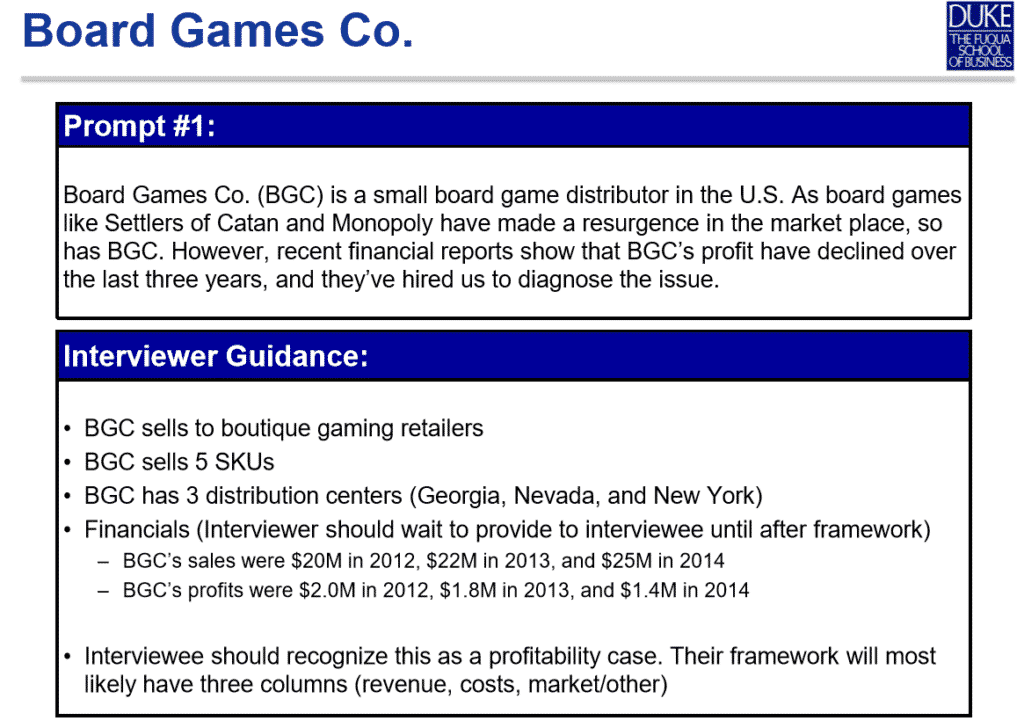
Once you understand the elements a stellar answer should have, you can use casebook questions to practice, even if you don’t have a good benchmark answer to compare yours with.
Join our free course, Case Interview Fundamentals, by filling out the form below:
Now, what?
Over the last chapter, you’ve learned…
- The SPECIFIC sources where you can find your case partners and how to determine whether a partner is good enough.
- How to nurture your inner circle to make sure you’ll always have great partners available (instead of gambling with your precious preparation time every time you need a mock interview).
- How to learn as much when you’re in the interviewer role as when you’re in the candidate role, using two advanced techniques you can’t find anywhere else.
- The Case Debrief Technnique, a technique once restricted to ONLY THE BEST OF THE BEST, that will make sure you’re always focused and learning as much as possible from each mock case.
- NUMEROUS sources of cases to make sure you’ll never run out of cases when you need them the most.
- How to use drills, a new tool to practice by yourself that’ll allow you to (1) make the most out of your time even when you can’t or don’t wanna do mocks and (2) have LASER FOCUS on your specific points of improvement.
- EXACTLY how to use our FREE course, Case Interview Fundamentals, to master solo practice and get rid of any blind spots you might have in your performance.
Now it's your turn: what are you gonna do RIGHT NOW?
Are you gonna go and do super-high-quality mock interviews?
Or are you gonna dive into laser-focused drills to tackle your specific weaknesses?
And which of the techniques I showed you will you start using RIGHT NOW?